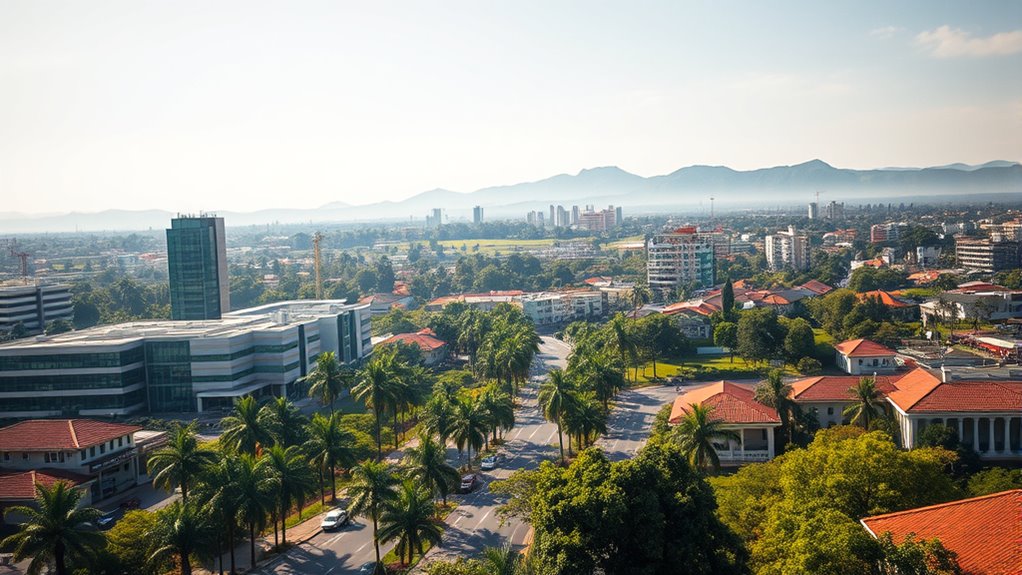Kigali stands out as a green capital because it prioritizes urban green spaces, integrates renewable energy like solar and hydropower, and promotes eco-friendly transportation such as electric buses and bike lanes. The city actively manages waste with recycling programs and encourages community involvement in sustainability efforts. Strong policies support environmental innovation, making Kigali a model for sustainable urban growth. Keep exploring to discover how these initiatives come together to create a truly eco-conscious city.
Key Takeaways
- Kigali integrates extensive urban green spaces and parks, enhancing air quality and biodiversity.
- The city leads in renewable energy adoption, especially solar and hydropower projects, reducing fossil fuel dependence.
- Strong waste management and recycling programs engage communities and promote sustainability initiatives.
- Investment in eco-friendly transportation, including electric buses and bike lanes, reduces pollution and congestion.
- Comprehensive policies and legislation support environmental resilience, conservation, and sustainable urban development.
Urban Planning and Green Spaces

Kigali’s urban planning prioritizes green spaces, making the city both functional and environmentally friendly. You’ll notice how urban green spaces are carefully integrated into the city’s layout, providing residents with accessible natural areas. The city’s focus on city park development enhances quality of life, offering spots for recreation, relaxation, and community gathering. These green spaces serve multiple purposes: reducing urban heat, improving air quality, and supporting biodiversity within the city. As you explore Kigali, you’ll see how thoughtful planning guarantees each neighborhood benefits from nearby parks and open areas. This deliberate approach to urban green spaces reflects Kigali’s commitment to sustainable development, blending urban growth with nature to create a healthier, more livable city. Additionally, Kigali emphasizes pollution reduction by incorporating environmentally friendly infrastructure and sustainable practices.
Renewable Energy Initiatives
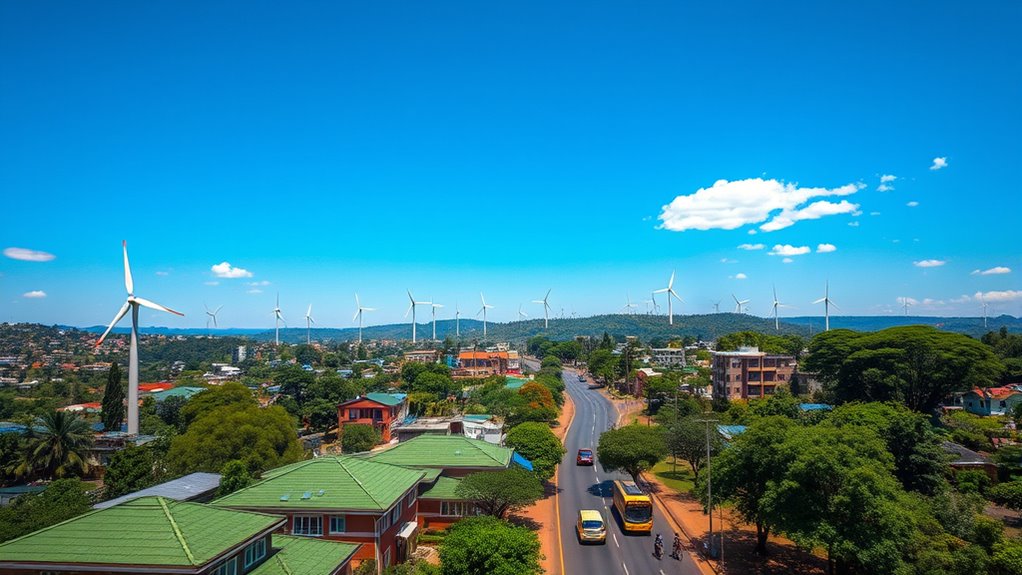
Kigali has made impressive strides in renewable energy by implementing solar power projects and expanding hydropower development strategies. These initiatives help reduce reliance on fossil fuels and power the city sustainably. How do urban energy policies support these efforts and shape Kigali’s green future? Incorporating long-term investment strategies into city planning further enhances the sustainability and resilience of Kigali’s energy infrastructure.
Solar Power Projects
Thanks to its ambitious renewable energy initiatives, Kigali has become a leader in solar power projects. You’ll notice the city’s focus on solar panel innovations and rooftop installation strategies that maximize efficiency. These efforts assure sustainable energy access while reducing reliance on fossil fuels. Kigali’s projects include innovative solar panels that capture more sunlight and improve durability. The rooftop strategies involve integrating solar systems into existing buildings seamlessly, saving space and lowering costs. To illustrate, here’s a snapshot of key aspects:
| Aspect | Focus | Benefit |
|---|---|---|
| Solar Panel Innovations | High-efficiency photovoltaic cells | Increased energy output |
| Rooftop Installation | Structural integration | Space optimization |
| Project Scale | Residential and commercial | Broader impact |
This approach underscores Kigali’s commitment to clean energy. Additionally, implementing energy storage solutions ensures a reliable power supply even when sunlight is limited.
Hydropower Development Strategies
As part of its renewable energy strategies, the city has prioritized hydropower development to harness its abundant water resources. You’ll notice how hydropower integration plays a essential role in Kigali’s energy mix, providing a stable and clean power source. The city focuses on optimizing water resource management to guarantee sustainable operation and minimize environmental impact. Investments in small and medium hydropower projects help diversify energy sources while reducing reliance on fossil fuels. By carefully managing water flows and infrastructure, Kigali enhances its capacity to generate electricity efficiently. This strategy not only boosts renewable energy output but also promotes resilience against climate variability. Additionally, implementing advanced AI Security technologies ensures that infrastructure and operational data are protected from cyber threats, enhancing the overall security and reliability of the energy system. Overall, hydropower development forms a cornerstone of Kigali’s commitment to sustainable, green growth.
Urban Energy Policies
Implementing innovative urban energy policies, Kigali actively promotes renewable energy initiatives to reduce its carbon footprint and enhance sustainability. The city invests in solar-powered urban lighting, which not only cuts energy consumption but also improves safety at night. You’ll notice how Kigali prioritizes energy efficiency by upgrading infrastructure and encouraging the use of energy-saving appliances. These efforts aim to decrease reliance on fossil fuels, making the city more resilient and environmentally friendly. The government also supports community-based solar projects, empowering residents to generate clean energy locally. By integrating renewable sources into urban lighting and overall energy management, Kigali sets a strong example of sustainable urban development. This approach guarantees cleaner air, lower emissions, and a healthier future for its residents.
Waste Management and Recycling Programs
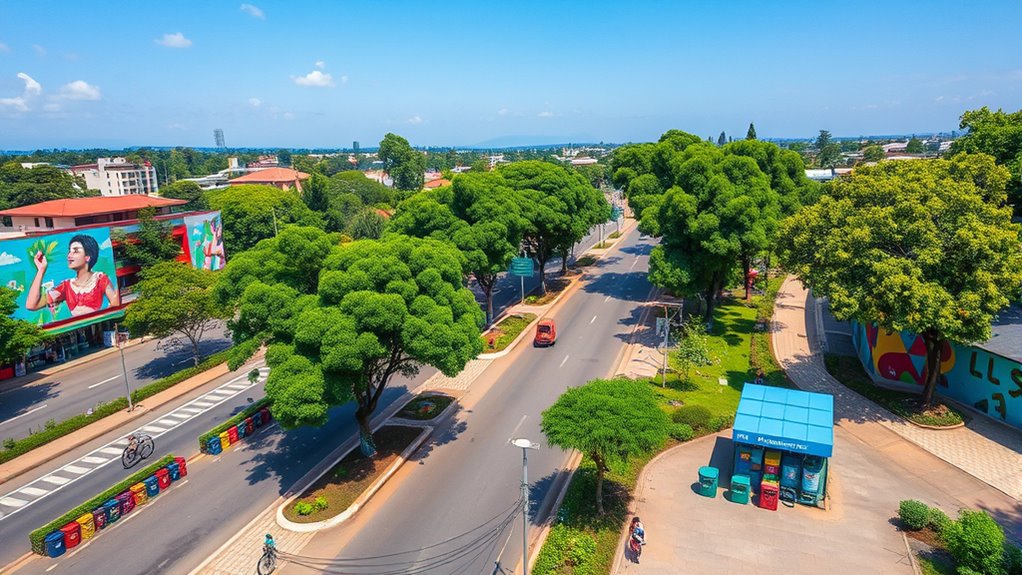
What sets Kigali apart in its approach to waste management and recycling? You’ll notice its strong focus on waste segregation at the source, making recycling easier and more effective. The city encourages residents and businesses to separate compostable, recyclable, and waste materials, reducing landfill overflow. Kigali also offers recycling incentives, motivating citizens to participate actively. These incentives include discounts, recognition programs, and support for eco-friendly startups. The government collaborates with local organizations to ensure proper waste collection and processing, turning waste into valuable resources. This integrated approach not only minimizes environmental impact but also creates jobs and promotes sustainability. With clear policies and community engagement, Kigali demonstrates how strategic waste management can transform urban environments into greener, healthier spaces. Incorporating sound design principles, the city effectively creates a harmonious environment that emphasizes both functionality and aesthetic appeal, enhancing public awareness and participation.
Sustainable Transportation Systems

Kigali has invested in bike-friendly infrastructure that encourages residents to cycle instead of drive, reducing emissions and traffic congestion. The city’s electric public transit system offers a clean, efficient alternative to traditional transportation options. These initiatives make Kigali a leader in sustainable mobility, inspiring others to follow suit. Additionally, the city’s focus on sustainable transportation systems demonstrates a commitment to environmental preservation and urban innovation.
Bike-Friendly Infrastructure
Thanks to its dedicated network of bike lanes and prioritized infrastructure, Kigali makes it easier for residents and visitors to choose cycling over motorized transport. The city has invested heavily in expanding and maintaining bike lanes, ensuring safe and accessible routes across urban areas. This focus encourages a strong cycling culture, where more people see biking as a practical and eco-friendly option. Clear signage and well-planned connections help cyclists navigate efficiently, reducing congestion and pollution. By fostering a supportive environment for cyclists, Kigali promotes healthier lifestyles and sustainable urban mobility. The emphasis on bike-friendly infrastructure signals the city’s commitment to reducing carbon emissions and creating a more livable, vibrant cityscape for everyone. Urban planning strategies further support the development of sustainable transportation options, making Kigali a model for eco-conscious cities.
Electric Public Transit
Have you noticed how Kigali is transforming its public transportation system with electric-powered options? The city is rolling out an expanding electric bus fleet, reducing reliance on fossil fuels and lowering emissions. These buses provide a cleaner, more sustainable way to move around, making Kigali more environmentally friendly. To support this shift, the city is investing heavily in charging infrastructure, installing stations at key transit hubs and along main routes. This robust charging network guarantees that electric buses stay operational throughout the day, improving reliability. The move to electric public transit not only cuts carbon emissions but also reduces noise pollution and operational costs. Kigali’s commitment to sustainable transportation demonstrates its dedication to becoming a green, resilient city for the future.
Community Engagement and Education
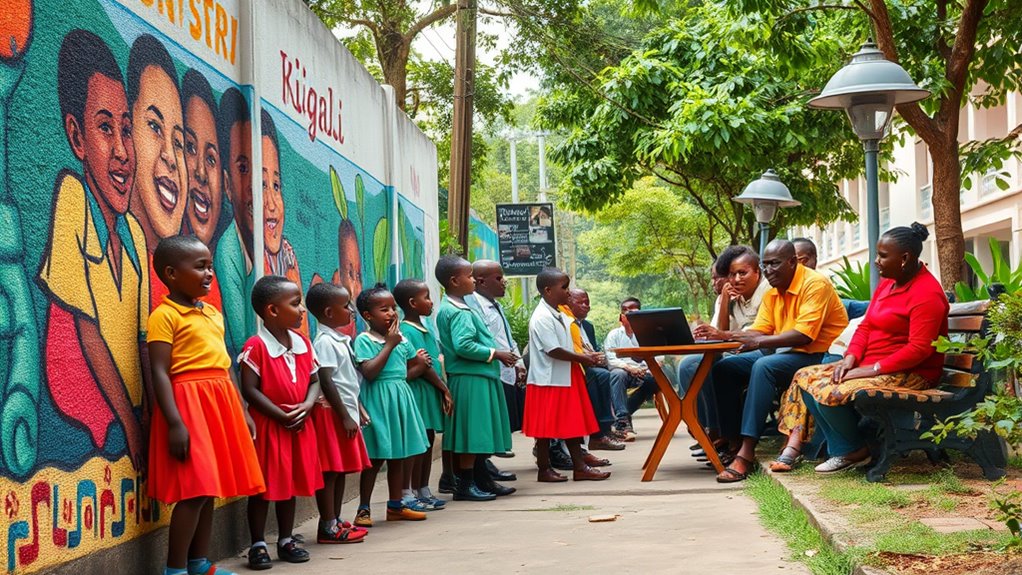
What role does community engagement play in Kigali’s sustainability efforts? It’s central to building a greener city. Through effective community outreach, residents become active participants rather than passive observers. This fosters a sense of ownership and shared responsibility. Educational programs focus on improving environmental literacy, helping you understand how daily actions impact the environment. Kigali’s initiatives include school campaigns, neighborhood workshops, and public events that promote sustainable practices. When you’re informed about waste management, conservation, and clean energy, you’re more likely to adopt eco-friendly habits. Community engagement ensures that sustainability isn’t just top-down policy but a collective effort. By empowering residents with knowledge and opportunities to participate, Kigali creates a culture where everyone contributes to a healthier, greener city. Engaging communities also involves understanding sustainable practices, which are crucial for long-term environmental success.
Policy Frameworks Supporting Sustainability
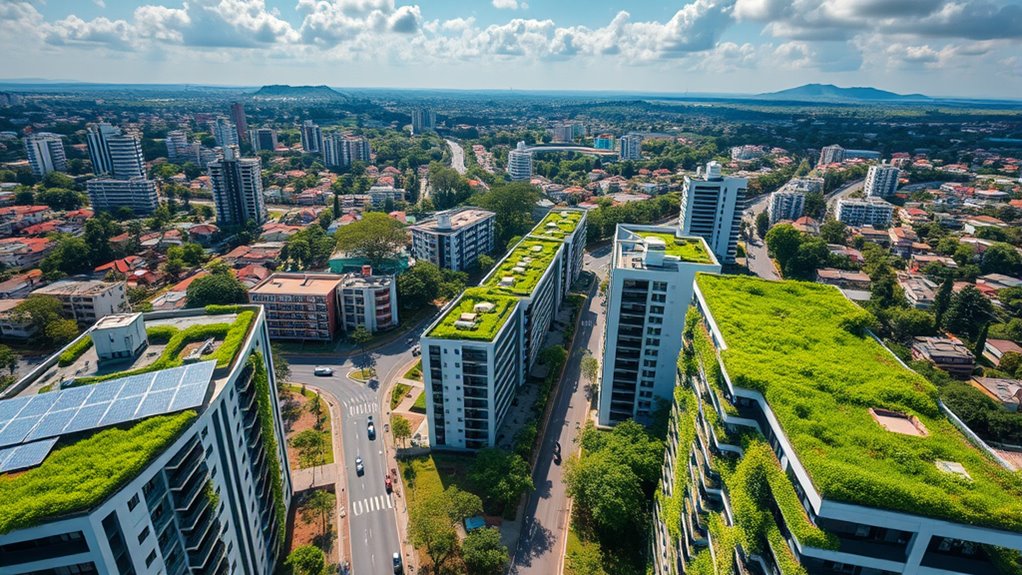
Kigali’s progress toward sustainability is supported by a robust policy framework that sets clear standards and incentives for environmental responsibility. The government has implemented strong environmental legislation that mandates waste management, conservation, and renewable energy use. These laws create policy incentives for businesses and individuals to adopt eco-friendly practices, fostering a culture of sustainability. Policies like bans on plastic bags and regulations promoting green building standards demonstrate a commitment to reducing environmental impact. By aligning legislation with national development goals, Kigali ensures sustainable growth while protecting natural resources. You’ll find that this extensive policy approach encourages innovation, accountability, and community participation, making Kigali a model city committed to achieving long-term environmental resilience. Additionally, fostering a culture of creative practice can further enhance community engagement and innovative solutions for sustainability challenges.
Innovative Eco-Friendly Projects
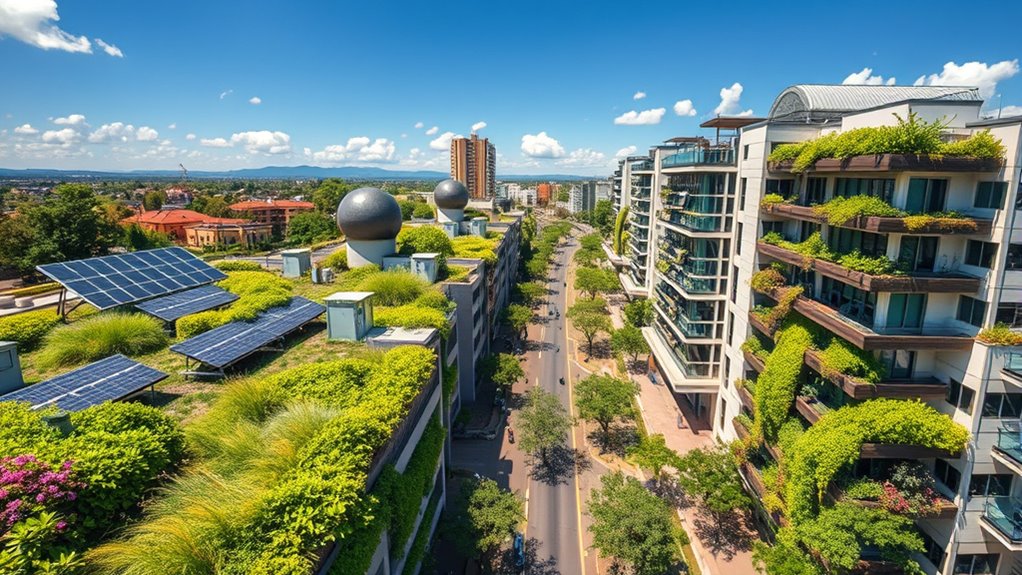
Innovative eco-friendly projects are transforming Kigali into a leader in sustainable urban development. You’ll notice how urban agriculture initiatives thrive within the city, turning vacant lots into productive green spaces that supply fresh produce and reduce food miles. Ecological architecture also plays a crucial role, with buildings designed to maximize energy efficiency and integrate natural elements, minimizing environmental impact. These projects promote a greener lifestyle and demonstrate Kigali’s commitment to sustainability. By embracing urban agriculture, the city encourages community involvement and self-sufficiency. Simultaneously, ecological architecture showcases innovative designs that blend aesthetics with functionality while respecting the environment. Additionally, sustainable practices are being adopted across various sectors, further reinforcing Kigali’s dedication to environmental preservation. Together, these projects position Kigali as a model for eco-conscious urban growth, inspiring other cities to adopt similar sustainable initiatives.
Frequently Asked Questions
How Does Kigali Measure the Success of Its Green Initiatives?
You can see Kigali measures the success of its green initiatives by monitoring improvements in urban air quality and tracking renewable energy adoption rates. When air pollution levels decrease and more renewable energy sources are integrated into the city’s power grid, it indicates progress. These metrics help you understand how well the city is achieving its environmental goals and creating a healthier, sustainable urban environment for all residents.
What Challenges Does Kigali Face in Maintaining Sustainable Growth?
You’ll find that Kigali faces challenges in maintaining sustainable growth, especially in upgrading urban infrastructure and boosting climate resilience. As the city expands, ensuring infrastructure keeps pace without harming the environment becomes tough. Climate resilience efforts are vital to withstand weather extremes. Balancing rapid development with eco-friendly practices is essential to sustain growth, protect residents, and preserve Kigali’s green reputation for the future.
How Are Local Communities Involved in Urban Green Projects?
Have you wondered how local communities shape Kigali’s green initiatives? You’re directly involved through community participation and local empowerment programs that encourage residents to take ownership of urban green projects. By engaging locals in planning and maintenance, Kigali fosters a sense of responsibility and pride. Isn’t it inspiring to see how collective effort transforms the city into a greener, healthier space? Your involvement truly makes a difference.
What Funding Sources Support Kigali’s Environmental Programs?
You find out that Kigali’s environmental programs are supported through various funding sources like public-private partnerships and international grants. These collaborations enable the city to implement sustainable projects effectively. By engaging local businesses and securing funds from international organizations, Kigali boosts its green initiatives. You see how such diverse funding streams help sustain and expand the city’s efforts toward environmental conservation and urban sustainability.
How Does Kigali Compare to Other African Capitals in Sustainability Efforts?
While other African capitals struggle with rapid urbanization, Kigali stands out through its commitment to sustainability. You’ll notice its extensive urban green spaces that offer relief amid city growth, and its aggressive renewable energy adoption reducing reliance on fossil fuels. Compared to peers, Kigali’s proactive policies create a cleaner, greener environment, demonstrating a forward-thinking approach that sets a high standard for sustainable development across the continent.
Conclusion
Kigali’s green spirit blossoms like a vibrant garden, where every initiative is a bright bloom of hope. With thoughtful planning, innovative projects, and community passion, it transforms into a shining beacon of sustainability. As you walk its eco-friendly streets, imagine a future painted in lush greens and clear blue skies—a city that nurtures both its people and the planet, proving that with collective effort, green dreams can truly come to life.

